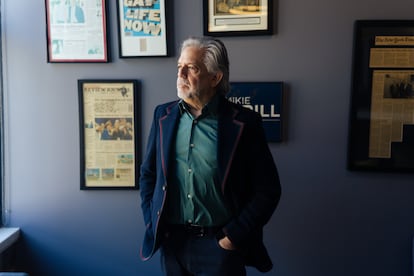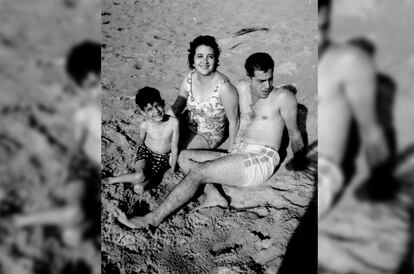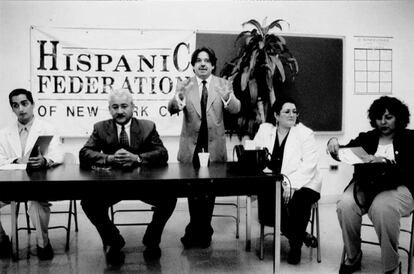Luis A. Miranda Jr.: ‘Some young Latino is going to take off like a rocket soon and become president of the United States’
The 69-year-old, who has been an activist for four decades and helped win over the Latino vote in several campaigns, has published ‘Relentless,’ a memoir about how the Hispanic community has become a transformative force in the country


When Luis A. Miranda, 69, arrived in New York from Puerto Rico more than four decades ago, he did not know that it was going to be a one-way journey. In love with the city and surprised by the discrimination suffered by his community, he dedicated himself from the start to defending the rights of Latinos. He was part of the administration of Ed Koch and Rudolph Giuliani in the mayor’s office of New York, although he soon abandoned the Republican ship, and helped an unknown Chuck Schumer and Hillary Clinton to gain the support of Latino voters. He also created the Hispanic Foundation to unite the entire community in a common struggle, although he found fame thanks to the success of his son, actor Lin-Manuel, who is the creator of the musical Hamilton and several Disney blockbusters. In his memoir Restless, he discusses what sways the Latino vote and how this community has become the greatest transformative force in the United States.
Question. Latinos have traditionally supported the Democratic Party, but polls show that many will vote for Donald Trump in November. Why are they attracted to someone who repeatedly insults them?
Answer. If you find out, call me right away. I’m racking my brain and my hair is turning whiter thinking about what could attract a Latino to Trump. But there are several things, on the one hand, Trump is entertaining. Many of the winning politicians from our countries of origin are entertaining, sometimes with ideas that make you want to die of shame, but they are entertaining. On the other hand, Trump presents himself as the person who is telling the truth, like he knows what he is talking about. Ninety percent of what comes out of that monster’s mouth are lies, but there are so many falsehoods that it is difficult to combat them. The [last] election was won fairly by [Democrat Joe] Biden, but 33% of people still believe he stole it. We are living in a time when falsehoods are becoming our daily bread.
Q. When Trump won the elections in 2016, you said that he was “an asshole who said stupid things” and that you never imagined that his movement would threaten democracy. What is your fear now?
A. My fear is that everything that comes out of that man’s mouth is hatred and falsehood. He has not talked about public policy, he has only talked about two things. He went to the National Rifle Association, a dying organization, to say that if he wins he’s going to give them life again because he will get rid of all the Biden laws to stop people from continuously killing one other in the streets. And he keeps telling the rich that he is going to cut their taxes. [Cut the taxes] of the people who need it the least, the people who are already spending money to take a trip into the atmosphere. What I hope is that as the trials come to an end, there will be a discussion about where the country is going and that people will begin to understand that a ruler cannot be elected to destroy all the institutions created to live in a civilized country.
Q. In 2020, you and Latino Victory gave your support to Joe Biden. Many Latinos today feel disappointed with the president.
A. When Biden took office, unemployment was at 14%, currently unemployment in the Latino community is 3%. Biden took the reins of the country when 20% of Latinos still did not have health insurance. That has been reduced by half. Biden took over the government when millions of Latino children were in poverty. That has been cut in half. I don’t understand what Biden has not been able to do for our community and for many other communities that Trump is supposedly going to do. In politics, people remember what happened last week, if gasoline increased from $3.20 to $3.30. It is our job to convince people that the world is not perfect and that you vote for imperfect people who cannot do everything. Within that imperfection one has to vote for whoever believes is best for our community. And I think that’s Biden.

Q. You helped Chuck Schumer and Hillary Clinton in their political campaigns to win the Latino vote. How was that community mobilized then and what has changed?
A. Hillary is a star in the political world. She was one of the few Democratic candidates to win the Cuban vote in Florida. It was a matter of bringing her to our community. Everyone was amazed by her talent, her intelligence and her commitment to the Latino community. It was a similar story with Schumer. No one knew him. Twenty-odd years later, Schumer remains a friend to Latinos across the country. Now it’s a little more complicated because of social media. WhatsApp and Facebook may not be important in other communities, but for us they are crucial.
Q. Why did you decide to share your experience now in a book?
A. After the 2020 and 2022 elections, all these experts on the Latino vote have appeared who look at the surveys that newspapers and other institutions were doing to reach conclusions. In the surveys, Latinos make up 8% of the people interviewed. The majority speak only English, when we know that 25% to 33% of Latinos communicate in Spanish. I continually complained about these fake experts and my friends told me: “You’ve been in this world for 45 years, why don’t you do something positive instead of complaining and write about your vision of what the Latino vote is?”
Q. You moved to New York in the 1970s to study psychology. In Puerto Rico, you were involved in the Socialist Party and your idea was to return. What made you change your mind?
A. Living in New York gave me enormous satisfaction, I felt like this city was made for me. And that’s when I met this girl in the doctoral program who has been my wife for the last 46 years. So between the love of New York and the love of Luz, I end up staying.
Q. You write in your book that when you went looking for work at Sears, you saw how Puerto Ricans were exploited. Has their situation improved at all?
A. There is no doubt that there has been an economic and social improvement in the Latino community. Half of Puerto Ricans are much better off than in the 1950s, 1960s and 1970s, although many still live in poverty. We Latinos are the ones who create the most small industries throughout the country. Many more young people have graduated from universities. But when we look at society as a whole, we are still lagging behind. That’s why it’s important to continue the fight.
Q. Your first experience in the mayor’s office of New York was with Ed Koch. Many friends on the left criticized you, arguing that you had sold out.
A. That was the first time that I faced real criticism, in the newspapers, because I had been a community activist and now I was in the mayor's office. On the one hand the criticism was true, but being there meant that I could watch the construction of the new schools up close. There was a whole plan for how to increase services to the Latino community in New York City that I helped create, so when I put things into balance, I stayed doing everything I could for the same community I was fighting for. outside.
Q. You say that there has been no immigration reform comparable to the law signed by Ronald Reagan in 1986, which legalized all undocumented migrants who arrived before 1982. What solution do you see for the current immigration crisis?
A. The solution is always political. It is incredible that a Republican president was the one who made the last amnesty law, bringing millions of people out of the shadows, and that the same party now uses immigration as a “bogeyman” to get elected. The Trumpist movement is the number one enemy of the country’s migrants. The fact that we don’t want to accept that and that there are Latinos who still believe that Trump serves their interests is like saying that I don’t get vaccines so that I get every disease. In these elections we not only have to defeat Trump, who is the head of this anti-migrant monster: we have to cut off all the tentacles that continue in the Senate and Congress, stopping immigration reform. [Election day] has to be the moment to get out of all the people who have turned immigration into the bad guy in the Hollywood movie.

Q. Despite being left-wing, you agreed to work for someone like Rudolph Giuliani in managing the hospital network. You say that you soon realized that he was “stingy to the core.”
A. I thought he was mean from the beginning, I’m not going to play dumb. I had been working for a year to improve public health, which is so important for our community, and for the first seven months there was no direct intervention from the mayor’s office. I left during a fight the mayor was having with the Republican governor, George Pataki, over AIDS aid. They wanted to make a $15 million cut in a $3 billion budget. For me, even though it was so small, it was symbolic. We were in the middle of the AIDS pandemic and if I stayed I would have been betraying my principles in a very basic way.
Q. You strive to differentiate Latinos by origin and oppose the group being seen as a monolith. However, you unified them by creating the Hispanic Federation.
A. None of us come from our countries of origin as Hispanic. I have never met anyone who gets off the plane and says “I am Hispanic.” They were Venezuelans, Colombians, Salvadorans, Dominicans; I was Puerto Rican. It is the Americans in their continuous quest to put people in a box who created the term Hispanic, and I see it as a positive situation to increase our political power. If everyone wants us to be Hispanic and I can sit at a table to negotiate in favor of 17 million instead of one million Puerto Ricans, I have increased my power 17 times, so I see it as a positive combination of factors. Structures had to be created that would give life to a concept: convince the Puerto Ricans, who at that time had the power, to give way to the Dominicans, that the Colombians and the Ecuadorians were around the corner and that together we were going to have much more power. That was my task in 1990 with the creation of the Federation.
Q. Bianca Jagger was recruited to give notoriety to the foundation’s first gala and you didn’t even know who her husband, Mick Jagger, was. Latinos are now experiencing a great moment of popularity thanks to music.
A. We have a very rich culture. When you think about Bad Bunny, Lin-Manuel [Miranda Jr.’s son], Shakira, Jennifer López... they are all different, but they all exalt Latinidad. That is the beauty of our culture.
Q. The 9/11 attacks frustrated the possibility of Fernando Ferrer, in whose campaign you worked, from becoming the first Latino to occupy the New York mayor’s office. It hasn’t happened again.
A. I continue to be encouraged by Barack Obama’s sudden rise in popularity and presidency. Who would have thought he would be president? What I have seen in the last decade, in which I have been very involved in national politics, is that there is a whole new generation of Latino politicians who are starting to climb the ladder, but still at a very local level. I know that one of them is going to take off like a rocket and be president of the U.S. When would we have ever thought that we would have a senator in Arizona, in Nevada, in Colorado, in California?
Q. When Hurricane Maria devastated Puerto Rico in 2017, your family stepped up to help. The Spanish chef José Andrés called you on the verge of tears because he needed $100,000 for his organization World Central Kitchen to continue distributing food to the victims and you gave it to him despite hardly knowing him.
A. The experience was moving, shocking for the Puerto Rican community and for all our allies. It also helped me meet a lot of good people. I met José Andrés and I can describe few people who have his same love for their neighbor. At that time, no one knew him, but we realized that he had a huge heart and if the way to help him was to give him $100,000, then that’s what we would do. The hurricane, with all its devastation, brought our community together like no other incident, it was the only positive thing about that moment.
Q. Another key moment in your life was the success of your son Lin-Manuel’s musical Hamilton.
A. Hamilton did two main things for my career and my family. On the one hand, investing in Hamilton gave us money for the first time to support all the causes we defended throughout our lives. Until 2016, we were a family that lived from paycheck to paycheck, no different than the vast majority of people. I still say to Luz: “We are no longer poor.” Secondly, he gave us a huge microphone.
Sign up for our weekly newsletter to get more English-language news coverage from EL PAÍS USA Edition
Tu suscripción se está usando en otro dispositivo
¿Quieres añadir otro usuario a tu suscripción?
Si continúas leyendo en este dispositivo, no se podrá leer en el otro.
FlechaTu suscripción se está usando en otro dispositivo y solo puedes acceder a EL PAÍS desde un dispositivo a la vez.
Si quieres compartir tu cuenta, cambia tu suscripción a la modalidad Premium, así podrás añadir otro usuario. Cada uno accederá con su propia cuenta de email, lo que os permitirá personalizar vuestra experiencia en EL PAÍS.
¿Tienes una suscripción de empresa? Accede aquí para contratar más cuentas.
En el caso de no saber quién está usando tu cuenta, te recomendamos cambiar tu contraseña aquí.
Si decides continuar compartiendo tu cuenta, este mensaje se mostrará en tu dispositivo y en el de la otra persona que está usando tu cuenta de forma indefinida, afectando a tu experiencia de lectura. Puedes consultar aquí los términos y condiciones de la suscripción digital.








































